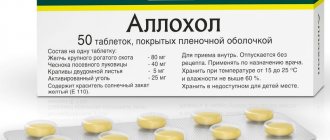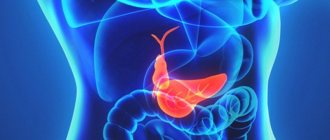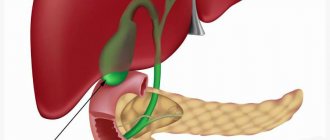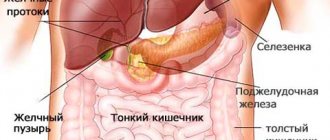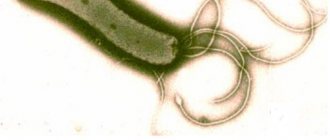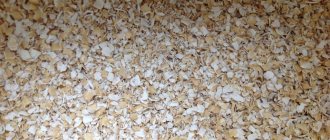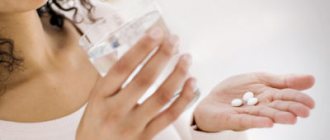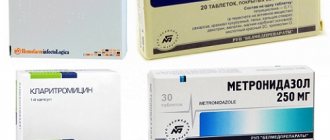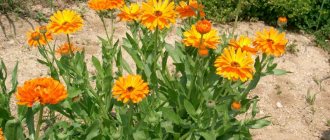23610
Cholecystectomy, or, in other words, surgery to remove the gallbladder, is one of the most common surgical interventions in Russia. The postoperative and recovery periods, as a rule, are not complete without taking medications.
What medications will you need to take after gallbladder removal, as well as general information about cholecystectomy and other useful tips and recommendations, you will learn from this article.
Indications and progress of the operation
The gallbladder is a small sac that stores bile. At the right moment, bile is released into the small intestine for subsequent participation in the process of breaking down food.
The main indication for cholecystectomy is cholelithiasis. Stagnation of bile leads to the formation of stones, which may not manifest their existence in any way, but may manifest themselves with an attack of biliary colic.
A person who has had an attack of biliary colic at least once in his life will never forget this moment. The fact is that the walls of the bladder, contracting, try to push the stone out, causing severe paroxysmal pain. If a stone comes out and gets stuck in the bile duct, this is fraught with complications such as obstructive jaundice and acute cholecystitis. In severe cases, peritonitis may develop.
As has already become clear, people with cholelithiasis can be divided into two categories: those who are not bothered by this problem in any way, and those who are admitted to the hospital with a diagnosis of biliary colic or acute cholecystitis. Do you need to go under the knife if you are diagnosed with stones, the presence of which does not cause discomfort? Modern surgeons do not give a clear answer to this question.
It all depends on the size and number of stones, as well as on the duration of the disease. Experts still recommend resorting to cholecystectomy after observing asymptomatic cholelithiasis for 2 years, since there is a high risk of complications - bacterial infection and the development of chronic cholecystitis.
If you experience more than one of the following symptoms, be sure to see your doctor for an examination:
- bitterness in the mouth;
- pain in the hypochondrium on the right;
- nausea, possible vomiting;
- sleep disturbance;
- appetite disorder.
Cholecystectomy is performed using two methods:
- By making an incision in the anterior abdominal wall. As a rule, this method is used in emergency cases, due to the high risks of complications in the postoperative period.
- By laparoscopy. Several small punctures are made on the patient's body, through which the doctor, using special instruments and a camera, removes the gallbladder. This method is more often used in modern medicine, since it is more gentle, and the patient after such an operation will be able to go home within a couple of days.
General recommendations for restoring the digestive tract
An operation to remove the gallbladder is a surgical intervention, after which the body must adapt to new conditions. Despite the important role this organ plays, you can live without it without any special restrictions. However, immediately after surgery, the risk of complications in the form of bile stagnation increases. To stimulate its elimination, there is a list of general recommendations:
- follow a diet, eat small meals and eat meals strictly by the hour;
- do not overload the digestive tract with fatty foods - if the gallbladder has been removed, bile may not accumulate in sufficient quantities at first;
- eat only boiled or steamed food, giving preference to cereals and vegetables;
- take medications to restore the flow of bile.
In addition to choleretic drugs, other groups of drugs may be needed. For severe pain, take analgesics and antispasmodics. Antibacterial therapy must be prescribed - timely use of antibiotics for preventive purposes will prevent the development of bacterial microflora and the appearance of purulent inflammation. If the gallbladder has been removed, it is also useful to take care of the condition of the liver and take a course of hepatoprotectors.
After cholecystectomy, you can return to your normal lifestyle within several months, but before that it is important to follow a diet and take medications for the outflow of bile
Life without a gallbladder
Patients who are scheduled for cholecystectomy often panic: is it dangerous to completely remove the organ and will it be possible to live normally after this?
The body can easily do without the gallbladder, since this organ is not vital. Bile will still be produced by the liver, the difference is that in the absence of a storage device - the gallbladder, it will continuously flow into the intestines.
After some time, the amount of bile produced will decrease, the body will adapt to the changes and the digestion process will proceed without difficulty.
However, there are a number of restrictions, the observance of which is very important in the period after cholecystectomy:
- Diet. The digestion process changes significantly, so you need to help the gastrointestinal tract and not burden its work with the digestion of heavy food.
- Limitation of loads , especially in cases where surgery was carried out not using laparoscopy, but by cutting the abdominal wall.
- Taking medications . The doctor must prescribe a number of medications that will help the organs cope with the increased load and the patient to eliminate the unpleasant consequences after the operation.
What medications to take after gallbladder removal
When bile stagnates, it is necessary to take a choleretic drug. Is it possible to take choleretic drugs in the absence of a gallbladder? In this case, it is necessary to take choleretic drugs. The medications taken to eliminate unpleasant symptoms will prevent congestion and secondary formation of stones.
Without a gallbladder, you need to take antispasmodic tablets, take choleretic drugs, vitamin therapy and immunostimulating therapy are also important. Such drugs must be taken according to the recommendations of the attending physician in order to eliminate biliary disease. Treatment for a removed gallbladder is prescribed in all cases.
Medicines after cholecystectomy
So, your gallbladder has been safely removed. Now the body has a lot of work to do to rebuild the digestion process, and various drugs can help it with this, the purpose of which is to reduce the load on the gastrointestinal tract and alleviate symptoms associated with changes in organ functions. Treatment will begin immediately after the operation, while still in the hospital, and you will finish the course at home.
Remember: only a doctor should prescribe medications; do not self-medicate so as not to harm yourself.
The following are the medications you need to take after gallbladder removal:
- Antispasmodics, or painkillers. Patients who have undergone cholecystectomy often complain of pain in the right side. The reason lies in the fact that too much bile enters the bile ducts, resulting in their spasm. Antispasmodics will relieve pain by relaxing the smooth muscles of the gastrointestinal tract and bile will freely leave the ducts, rushing into the intestines. The well-known antispasmodic is “No-spa”. The drug is fast-acting: the pain will subside within 10-15 minutes after administration. Other agents with a similar effect: “Drotaverine”, “Buscopan”, “Duspatalin”, “Mebeverine”.
- Choleretic agents. They stimulate the active production of bile, have a beneficial effect on liver function, prevent the formation of congestion in the bile ducts, and prevent the formation of stones. The most famous drugs: “Allohol”, “Holosas”, “Cholenzim”.
- Enzymes. Thanks to them, food will be actively broken down, despite the fact that the amount and concentration of bile entering the intestines after removal of the gallbladder may not be enough for this. They have a slight analgesic effect. The most famous drugs of the group: “Mezim”, “Festal”, “Creon”. All of them contain enzymes and will help your body cope with the digestion process and avoid heaviness, nausea and excess gas formation after eating. These medications should be taken strictly as prescribed, as in case of overdose they can cause hologenic diarrhea.
- Hepatoprotectors. They are needed to protect and restore liver cells, prevent the re-formation of stones, and may also have a choleretic effect. This includes drugs such as: “Karsil”, “Essentiale”, “Ovesol”, “Ursofalk”, Ursosan”.
Drotaverine
Buscopan
Duspatalin
Allohol
Holosas
Creon
Karsil
Ovesol
Problems with the intestines are the scourge of patients with gallbladder removal. Unfortunately, it is unlikely that these problems can be avoided: it is all due to an insufficient amount of enzymes that help better digestion of food.
Flatulence, bloating, diarrhea or constipation - diet and medications prescribed by your doctor will help you cope with this: Espumisan, Duphalac, Dimethicone and the like.
If cholecystectomy was preceded by an inflammatory process, an additional course of antibiotics is prescribed. The choice of drug and the duration of its use is determined solely by the attending physician.
Antispasmodics
No-spa is a strong antispasmodic. The main beneficial property is relaxation of the smooth muscles of the sphincter. The medicine enters the blood ten minutes after administration and relieves antispasmodic pain in the bile duct that occurs when liquid secretions enter the intestines. An intramuscular injection of No-shpa works faster than tablets.
Smooth muscles are relaxed by Mebeverine and Duspatalin. Providing a myotropic effect, they relieve spasms, stomach discomfort and colic. They act 20 minutes after administration and have virtually no side effects.
Folk remedies
A combination of recipes from traditional medicine and a course of medications will help to significantly increase the effectiveness of the therapy. Healing infusions are made from dried herbs, which can be purchased at any pharmacy.
The use of such drugs should be agreed with your doctor, and also taking into account individual intolerance. Immortelle flowers, corn silk, milk thistle seeds, chicory, cudweed and other herbs have proven themselves well as choleretic agents.
Below are several recipes that will be useful as an aid during the recovery period after gallbladder removal.
- Infusion of birch leaves and buds. Take both ingredients in a 2:1 ratio, pour 250 ml of boiling water and leave to brew for 1 hour. Take the resulting infusion half a glass 4-5 times a day. It has a choleretic effect, helps the stomach function and speeds up metabolism.
- Infusion of milk thistle seeds. You will need 2 tbsp. seeds that need to be crushed to a powdery state. Pour 1/2 liter of water and boil over low heat until the initial volume of the infusion is reduced by half. The resulting liquid must be filtered and drunk every hour, a spoonful. This remedy will improve the functioning of the liver and bile ducts, and also has a mild choleretic effect.
- Corn infusion. Pour a glass of boiling water over 2 tablespoons of corn silks and simmer for half an hour under a closed lid. Strain the resulting liquid, pour it into a glass, and top it up with boiled water. Take half a glass per day.
Classification of choleretic drugs
Choleretic drugs are a broad group of drugs that affect the secretion and outflow of bile. They can be of plant origin or artificially synthesized. All drugs used have a similar effect.
In the postoperative period, they simultaneously have several beneficial effects:
Back pain after gallbladder removal
- help eliminate congestion in the bile ducts;
- normalize digestive processes through sufficient flow of bile into the small intestine;
- reduce pain that occurs after surgery when bile presses on the walls of the biliary tract;
- prevent the thickening of bile and the formation of stones;
- reduce the likelihood of bacterial infection due to the natural properties of bile to destroy bacteria.
A huge number of drugs are produced to support the functioning of the biliary tract. They have different chemical structures and affect different stages of bile secretion and excretion. Some of them can be replaced with natural herbal decoctions, the rest are recommended to be taken only in tablet form. All known choleretic agents can be divided into two categories:
- choleric agents - medications that activate the production of bile in liver cells;
- cholekinetics - drugs to stimulate the movement of bile along the biliary tract.
An important piece of advice when choosing medications is to focus on how you feel. After removal of the gallbladder, pain associated with spasm of the bile ducts often occurs. If during this period you take drugs that stimulate contractile function, the spasm may intensify. In the absence of pain, such medications can be taken without fear, and they can also be combined with antispasmodics.
Physical exercise
Heavy loads are extremely undesirable during the first 6-12 months after surgery. You should especially be wary of activities that place a lot of tension on your abdominal muscles. Failure to follow these recommendations may lead to the formation of a hernia and suture dehiscence.
But this does not mean that you just need to lie down and not move. Therapeutic gymnastics and simple physical exercises help speed up recovery by activating intra-abdominal circulation and stimulating the functioning of internal organs.
Swimming is also a great way to help your body recover. 2 months after cholecystectomy, you can already begin to get in shape by doing morning exercises and walking in the fresh air.
These types of activities will not only help you recover faster, but will also give you a lot of positive emotions, which is also important for a harmonious state in general.
Choleretic medications
Choleretic drugs are prescribed to patients after cholecystectomy to protect the liver from stagnation of secretions and prevent inflammatory processes. Spicy and fatty foods are contraindicated for cholelithiasis. Natural remedies Allohol and Cholenzym promote the absorption of beneficial microelements from food and prevent upset and bloating.
Allochol increases the volume of bile produced by the liver and reduces the risk of re-formation of stones. Consists of pig bile, activated carbon, garlic and nettle extracts. Thanks to the presence of activated carbon, it neutralizes toxins in the intestines and interferes with metabolism.
Cholenzym is a complex that includes: an enzyme from dried animal pancreatic glands, it is natural and promotes the breakdown of food during heaviness and constipation.
For cholecystectomy, an effective herbal remedy is holosas based on rose hips. A sugary-sweet medicine, containing large quantities of flavonoids, pectin, acids, vitamins and essential oils, has an anti-inflammatory effect, improves the production of bile and stabilizes its transport through the liver ducts.
For what purpose are medications prescribed?
First of all, people suffering from cholelithiasis need drug therapy. Impaired functionality of the gallbladder does not act as the main cause of the disease. Therefore, removing an organ will only relieve a person from painful sensations and prevent the danger of tissue rupture and obstruction of the biliary tract.
After the operation, bile stops accumulating, it becomes less saturated and enters the duodenum in small quantities. Against this background, changes occur in the digestion process. In combination with other postoperative consequences, such changes lead to the following symptomatic manifestations:
- dysfunction of the gastrointestinal tract, accompanied by excessive accumulation of gases and hologenic diarrhea;
- obstructive jaundice and hepatic colic;
- violation of the functionality of the stomach;
- paroxysmal pain in the stomach.
Among other things, pathogenic bacteria that penetrate into inflamed tissues after surgery can create additional health problems. Therefore, it is very important not only to strictly adhere to all medical recommendations regarding nutritional rules, but also to perform special physical exercises aimed at normalizing the functioning of the digestive system.
You should also take all prescribed medications after removal of the gallbladder, and if any alarming symptoms appear, do not hesitate to go to the doctor.
Types of choleretic agents
Today, the pharmaceutical market offers a wide selection of drugs whose action is aimed at improving the outflow of bile after cholecystectomy. Each of these medications contains different medicinal substances, respectively, and their effects are slightly different from each other. All medications of this type are divided into two main types:
- cholekinetics – help enhance the secretory function of the liver, improve the dynamics of fluid movement through the ducts after a surgical procedure.
- choleretics - increase the volume of secretions produced by the liver, relax the smooth muscles of the organ.
Choleretics are extremely necessary drugs in the presence of liver dysfunction. They stimulate an increase in fluid volume, thereby preventing its stagnation. People suffering from liver cirrhosis, hepatitis and other similar diseases simply need to take medications of this type.
There are two types of such medicines:
- substances created artificially - Cyclalone, Oxafenamide, Nicodin;
- medicines of natural origin - Allohol, Cholenzym.
As for cholekinetics, the principle of action of such drugs is slightly different from the above-mentioned drugs. Drugs of this type are aimed at improving the tone of the bile ducts without interfering with the functioning of the body itself.
There are three types of such drugs:
- polyalcohols - these include sugar substitutes, sorbitol, birch xylitol, sugar.
- salts - the most famous is magnesia, which has antispasmodic and laxative properties.
- vegetable oils - sunflower, olive and castor oils have a gentle effect on the liver, helping to improve the outflow of bile and eliminate defecation disorders.
It is worth remembering that the most appropriate medications after removal of the gallbladder can only be prescribed by a competent specialist, based on the individual characteristics of the patient’s body. Irrational use of medications can only complicate the situation and lead to the development of undesirable consequences.
List of medicines recommended by doctors
The doctor decides what medications to take after removal of the gallbladder to avoid disruption of the digestive system.
Gastroenterologists and surgeons have compiled a list of proven drugs. Doctors recommend taking the following medications in a short course lasting 10-30 days:
- Plant-based syrup "Holosas". Many patients are interested in whether it is possible to drink Holosas when the gallbladder has been removed. Gastroenterologists say it is necessary. The herbal medicine dilutes bile, prevents dyskinesia and protects liver cells.
- The drug "Karsil", containing plant extracts, heals hepatocytes. After resection of the gallbladder, additional stress falls on the liver and it is necessary to protect its cells.
- Allohol tablets, which make it possible to compensate for the insufficient enzymatic activity of the digestive tract that occurs in the patient after surgery. The composition includes bile acids and natural plant components that stimulate the production of enzymes. Doctors characterize Allohol as affordable and effective.
- Drotaverine tablets that reduce postoperative pain. Additionally, the drug eliminates spastic constipation, hepatic colic and prevents contractions of the bile ducts.
- Cholenzym capsules, which have a choleretic effect. Taking the drug helps get rid of nausea, flatulence or dyspepsia. The latter term means painful digestion.
- The Urosfalk suspension, which protects hepatocytes from damage, promotes the regeneration of liver tissue.
- Enterosorbents with lignin. Necessary to eliminate intoxication caused by decreased digestive function and stagnation of semi-digested food in the stomach or upper intestines.
- The drug “Mezim” stimulates the pancreas, increasing the secretory activity of the organ.
- Dufolac syrup, necessary to eliminate constipation associated with difficulty in osmotic metabolism in the intestines. Additionally, the product helps restore disturbed intestinal microflora.
- Dimethicone tablets, recommended to prevent flatulence with a tendency to increased gas formation.
- Linex powder, restoring intestinal microflora. The drug is prescribed to prevent dysbacteriosis.
- Tablets "Cerucal", eliminating nausea and vomiting.
Individually selected medications will improve the functioning of the digestive tract and compensate for enzymatic deficiency that occurs after removal of the gallbladder.
How does the disease manifest?
Biliary gastritis manifests itself as dyspepsia of the digestive process and periodic pain. After eating, the patient's sensations intensify. If the pathology is asymptomatic, then there will be no obvious symptoms, as with other biliary pathologies. Based on the decrease or increase in acidity in the stomach, symptoms can vary significantly.
Typical symptoms of biliary gastritis:
- heaviness in the stomach and fullness of the stomach;
- bloating and flatulence in the abdomen;
- dull and aching pain;
- formation of ulcers in the corners of the lips;
- bitterness in the mouth and belching, unpleasant aftertaste;
- problems with stool - constipation and diarrhea;
- vomiting with the release of bile;
- anemia of various types;
- weight loss and lack of appetite.
Gastritis with increased acidity in the stomach is characterized by heartburn and belching with acid, aching pain in the stomach. Gastritis with low acidity in the stomach is expressed as heaviness and belching of air, bloating and lack of appetite.
Herbal preparations
In case of mild consequences after surgery to remove the gallbladder, you can resort to the use of mixed choleretic drugs. These types of drugs act simultaneously as choleretics and cholekinetics.
Medicines of this type consist exclusively of natural ingredients and do not contain chemicals, therefore they have a milder effect on the human body.
The main advantage of such products is their complete harmlessness and more gentle action. In addition, unlike self-prepared infusions of medicinal herbs, the active substances in the preparations are strictly dosed, so their use will be much easier and more convenient.
Only a doctor can answer the question of what medications to take after gallbladder removal. Any deviations from medical recommendations can cause serious consequences, so if any symptoms appear, the first thing to do is contact a qualified specialist.
Symptoms after surgery to remove the gallbladder are combined into a common medical definition - postcholecystectomy syndrome. The group of this deviation includes various diseases that develop against the background of the absence of an organ. They are mainly associated with impaired outflow and excretion of bile.
